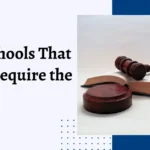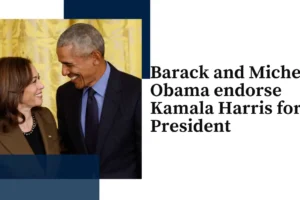Updated March 28: Gov. Doug Ducey today signed the budget bills into law.
Today I signed a bipartisan state budget agreement. Proactively addressing #COVID19 remains our top focus, and this bipartisan budget reflects that. It adds critical new resources—including $50M—for Arizonans who have had their lives turned upside down due to COVID-19. 1/
— Doug Ducey (@dougducey) March 28, 2020
“I commend legislative leaders of both parties, and all the Republican and Democratic members who shaped and passed this package, for coming together, putting politics aside, and showing real leadership,” Gov. Ducey said.
“It’s reflective of what we are seeing all across our state — Arizonans uniting to slow the spread of COVID-19 and save lives,” Gov. Ducey said.
“Our job isn’t done with this package of budget bills. There will certainly be more work to do and many tough decisions ahead of us as we better understand the full impact of this crisis on our citizens and on our economy,” Gov. Ducey said. “But Arizona is once again showing what it means to come together and put the good of our citizens before partisanship or politics.”
The budget bills include $50 million to deal with the COVID-19 pandemic.
New funding in the budget includes:
- $175 million for the third installment of the 20% by 2020 teacher pay raise plan. In total, Arizona has added $645.2 million for Arizona’s public school teachers as part of the 20×2020 initiative – resulting in permanent funding for a 20 percent increase for average teacher pay;
- $67 million in accelerated flexible funding for schools, which can be used on things such as technology, textbooks, building renewal, and personnel;
- $90 million for school building renewal, in addition to $28 million FY2020 supplemental funding, for a total of more than $118 million in new dollars for school repairs and maintenance;
- $23 million to improve access to quality child care for low-income working families and foster parents by providing incentive bonuses to quality child-care facilities ranked by First Things First;
- $15 million to fully fund the Water Quality Assurance Revolving Fund (WQARF) program. WQARF is Arizona’s alternative to the EPA’s approach to remediating contaminated hazardous waste sites — this budget will mark the first time since 2007 that the State is fully funding the program from the General Fund;
- $11 million for lock, HVAC, and fire suppression systems in correctional facilities;
- $8 million to expand access to behavioral health services for uninsured and underinsured kids;
- $5 million for the first year of the Arizona Industry Credential Incentive Program, helping more students become workforce ready;
- And $3 million in additional resources to prepare for the opening of the state’s newest Veteran Homes in Flagstaff and Yuma next summer.
NEW: Gov @dougducey today signed Arizona’s bipartisan state budget agreement, which includes $50 million for Arizona’s #COVID19 response.
— The 9th Floor (@9thFloorAZ) March 28, 2020
Updated March 27: Gov. Doug Ducey today signed House Bill 2910, sponsored by Rep. Michelle Udall that received unanimous support in the Arizona Legislature.
I’m proud to sign #HB2910. This legislation:✏️Provides clarity on testing requirements✏️Gives direction on make-up days✏️Requires schools to continue to provide learning opportunities
✏️Ensures teachers & staff see no disruption in pay as a result of #COVID19.
✏️And more 1/— Doug Ducey (@dougducey) March 27, 2020
The bill provides flexibility on statewide testing requirements, school letter grades, requires learning opportunities for students to continue, and ensure teachers and staff see no disruption in pay as a result of COVID-19.
“During this unprecedented time, parents and educators need certainty so they can plan and make decisions — and this bill provides it,” said Governor Ducey. “It protects our teachers and prioritizes our students, ensuring kids continue to receive instruction even with schools closed.”
“I’m grateful to our education leaders, Superintendent Hoffman, Representative Udall and Senator Sylvia Allen for their leadership, and thank members of both parties for their unanimous support,” Gov. Ducey said. “This is what coming together to support our kids and families looks like, and Arizona is again leading the way.”
Schools will offer students general education through alternative formats starting March 30 until the COVID-19 school closure ends. School employees who are able to perform their tasks outside of school will resume work remotely on March 30. If an employee is unable to perform their work remotely, they will be assigned other tasks.
Updated March 25: During an Arizona School Boards Association and Arizona Association of School Business Officials webinar on the budget and COVID-19 school closure bill, Superintendent of Public Instruction Kathy Hoffman said many schools have shared with her the creative ways they are providing services and serving meals to students.
“I want to you to know I’m sharing all your stories across the agency, the media and with the governor,” Hoffman said.
“I’m so impressed with how our educators are rising to meet this unprecedented challenge,” Hoffman said.
“Much of the guidance reflected in the legislation is what you’re hearing about today,” Hoffman said.
“If you feel that there are pieces that have not been addressed or if you have questions please reach out to us by email,” Hoffman said.
While talking about HB 2910, the COVID-19 school closure legislation, Chris Kotterman, director of governmental relation for Arizona School Boards Association, said Gov. Doug Ducey is expected to sign this bill and the budget bills.
The Governor and Supt. of Public Instruction have said schools will remain closed until April 10.
“The first two weeks of the closure which we’re in right now, there’s no requirement that schools do anything but get ready,” Kotterman said.
The second part of the bill provides continued relief from instructional time requirements if schools offer general education opportunities to students for the duration of the school closure or until the end of the academic year, Kotterman said.
The bill requires districts to pay all employees including hourly employees for the duration of the school closure, Kotterman said. In addition, employees cannot be required to take sick leave or vacation time for the two-week period.
Going forward beginning March 30 all employees are required to be paid if they are working remotely if they are able to do so. If they’re not, then the employee is assigned other tasks for the duration of the closure. It also requires all employees to resume normal work when schools reopen.
If the closure is lifted before the end of the school year, schools will either resume normal operations until the end of the school year of the schools or they may remain closed and continue to offer general education opportunities for the end of the school year, Kotterman said.
“This is local control for schools,” Kotterman said.
The statewide assessment will be canceled, Move on When Reading is suspended, and a school’s letter grade for this school year will be the same as for last year.
In addition, Arizona State Board of Education said it will not enforce the 3 Ds equal an F requirement for this school year, Kotterman said.
For school finance concerns, the daily route mileage for this school year will be considered that of the previous year to calculate the transportation support level, Kotterman said.
“This just makes sure you’re not going to drop down on your transportation support level because your mileage went down this year,” said Chuck Essigs, governmental relations director for Arizona Associaiton of School Business Officials.
School districts must still comply with state law and continue to adhere to state procurement rules, while navigating the challenges presented by COVID-19, and procurement staff can work from home or at the district if social distancing is in place during the school closure, Kotterman said.
The bill directs the Arizona State Board of Education to adopt rules that will apply to make sure that students will graduate, Kotterman said.
It also allows schools flexibility to use money generated during this school year to provide summer school instruction this summer and allows a students who takes an online summer school course to generate up to 1.25 ADM in fiscal year 2021.
“They will not waive any credits though. We are still retaining standards,” Kotterman said.
Special education during school closure
For special education, the bill allows schools attemp to ensure that each students with a 504 plan or IEP has access to the same general educational opportunities.
“The IDEA is a complex set of federal regulations that talks about how special education services should be implemented and outlines protections for students with disabilites,” said Alissa Trollinger, deputy associate superintendent of exceptional student services for Arizona Dept. of Education.
Federal guidance says that if a school is providing educational opportunities to all students then special education students are entitled to those opportunities to the greatest extent possible, Trollinger said.
Interim plans for services can be done during this school closure, but holding a meeting to change and IEP or 504 does not have to be held to allow these distance services to continue in the interim, Trollinger said.
Funds can be used for activities that directly provide services for special education services, Trollinger said.
“Special education teachers are out there doing what they do, providing services, consulting with each other and finding innovative solutions to students’ needs,” Trollinger said.
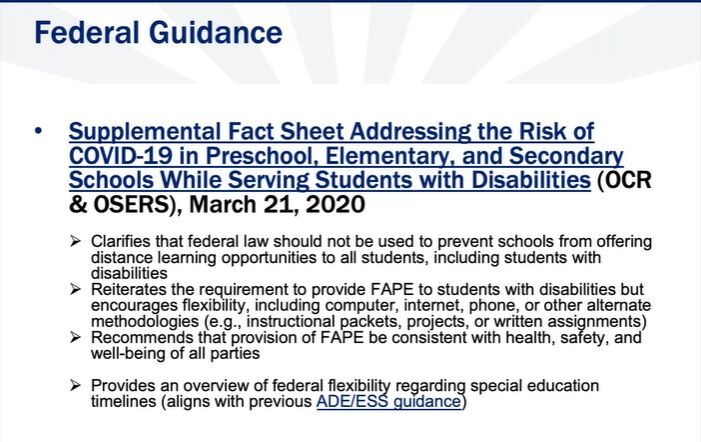
“I think it’s important that communication with parents happens early and often,” Trollinger said. “It’s just better for kids and families.”
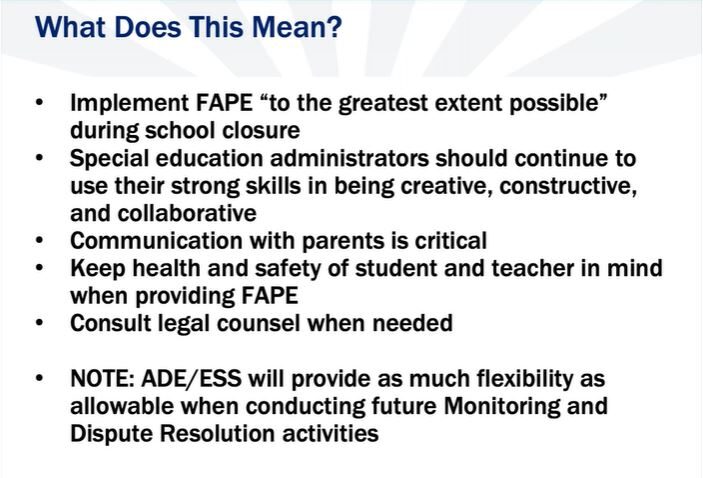
Also included are links to resources on the ADE’s Exceptional Student services web page.
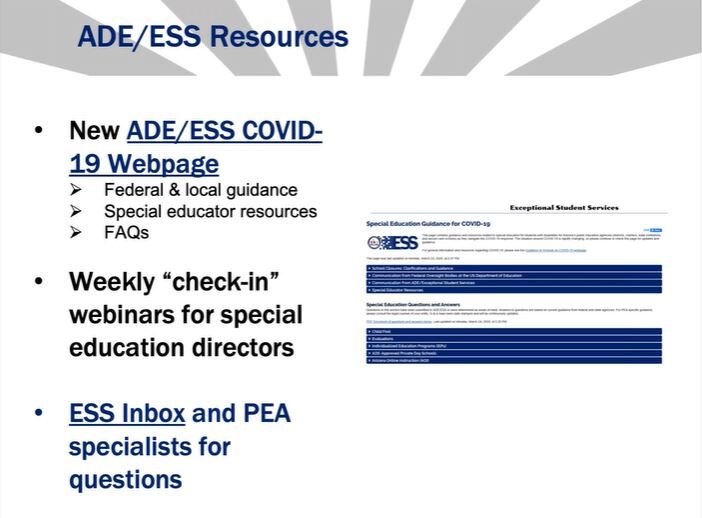
Webinar update on the budget bills
The streamlined or skinny budget is an operating budget to keep the state running after July 1, just in case the Arizona Legislature cannot get back in time to go through the normal budget process, Kotterman said.
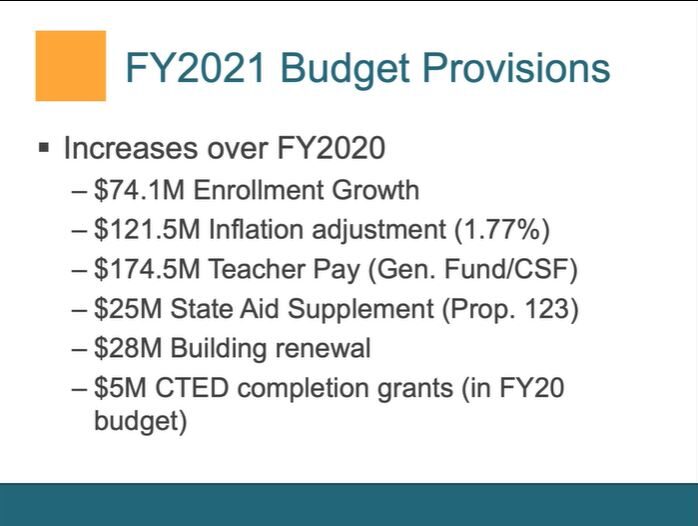
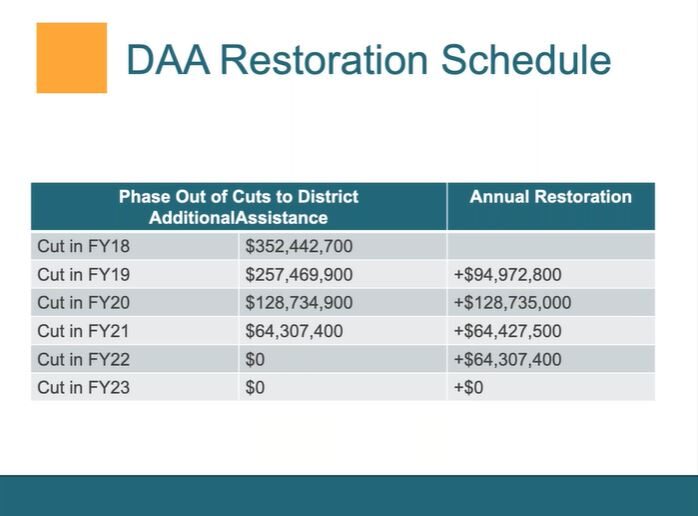
“At this pace, if the Legislature does nothing else we will be fully restored by fiscal year 2022,” Kotterman said.
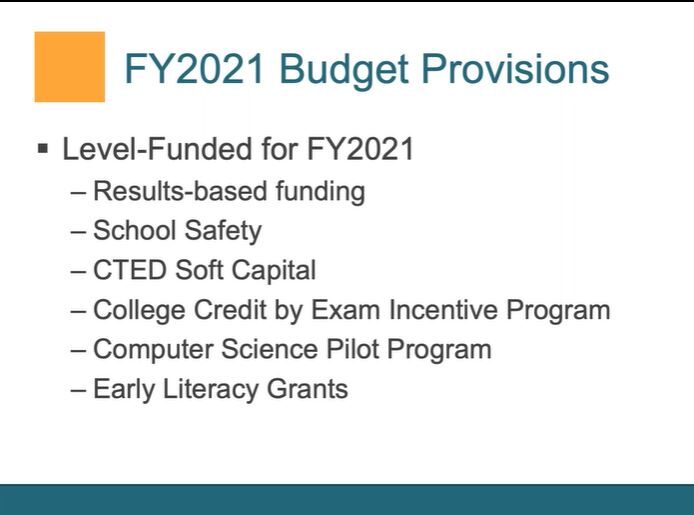
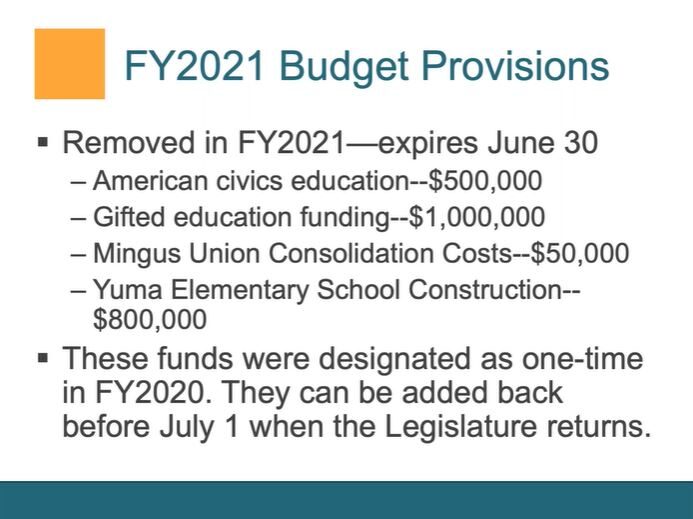
The Legislature is scheduled to come back to the Capitol April 13 and there is time to alter this budget before July 1, “so there may be an opportunity to get some of this money back there for gifted,” Kotterman said.
The K-12 base level funding for schools will increase by $155. 30 in the fiscal year 2021 state budget, said Essigs.
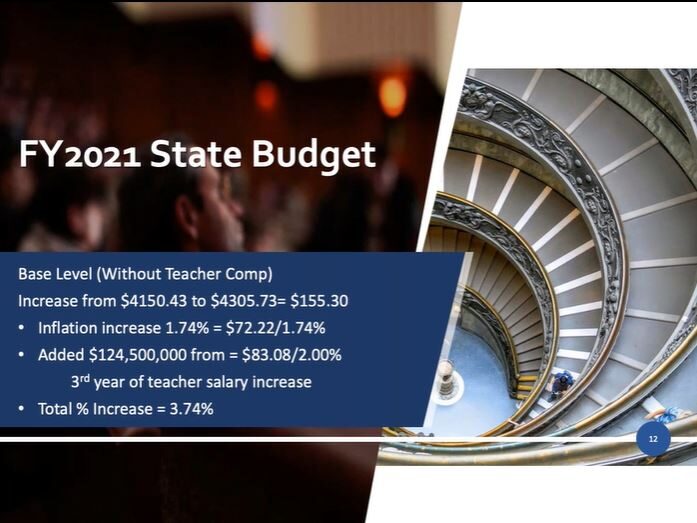
Between the $50 M available in the Classroom Site fund and the $124 M increase in the base level, and $50 M now that the $50 M in SFB debt services is paid off, there will be $174.5 M available for the teacher salary increase, Essigs said.
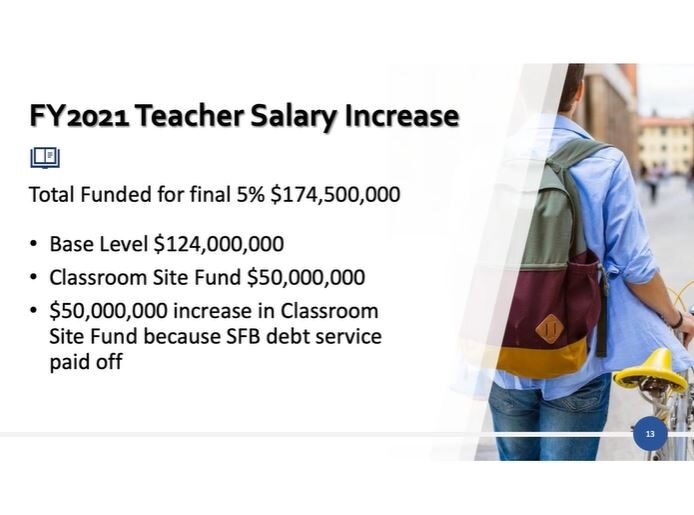
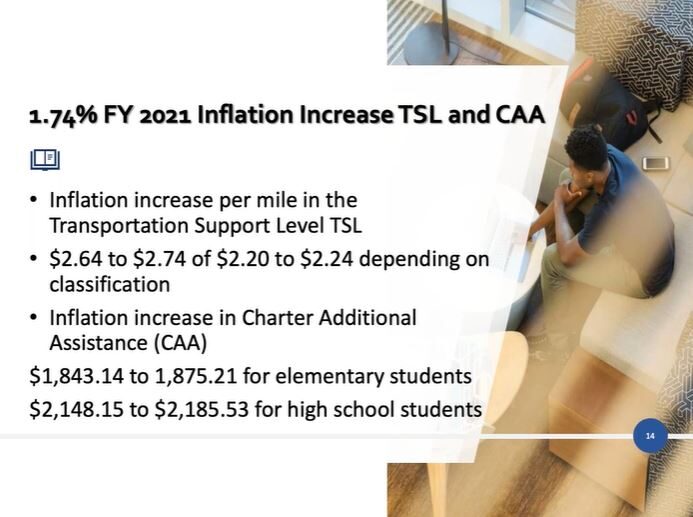
“If district want to get a rough estimate of what this will mean to them, reduce that cut by cutting it in half that will be the formula for next year and adjusted to your student count,” Essigs said
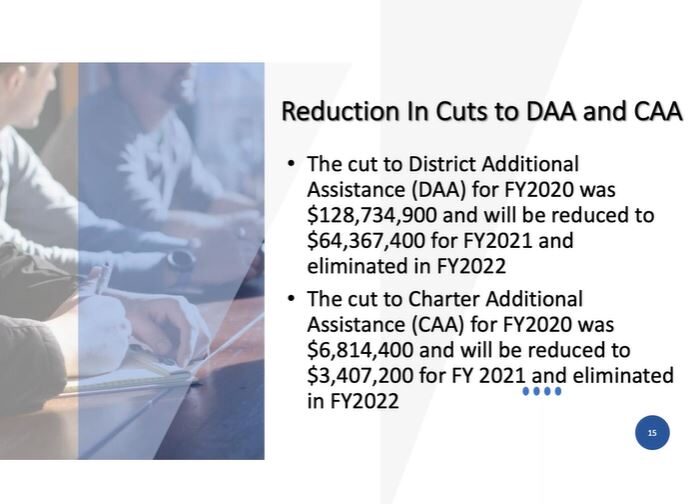
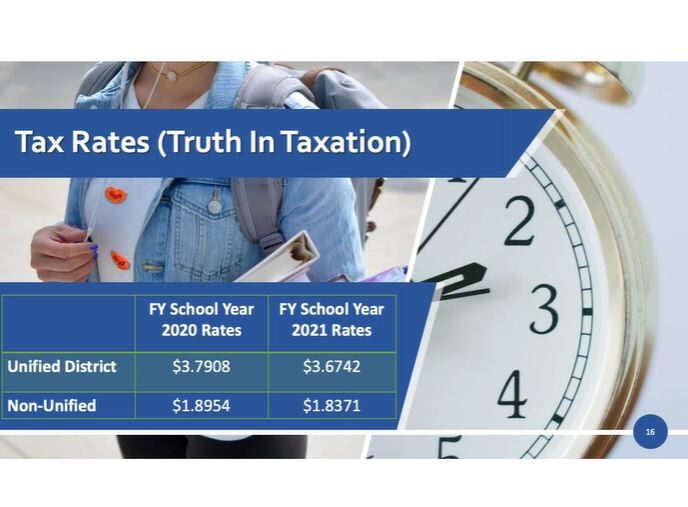
The building renewal money will be in a grant program of $107.5 million, Essigs said.
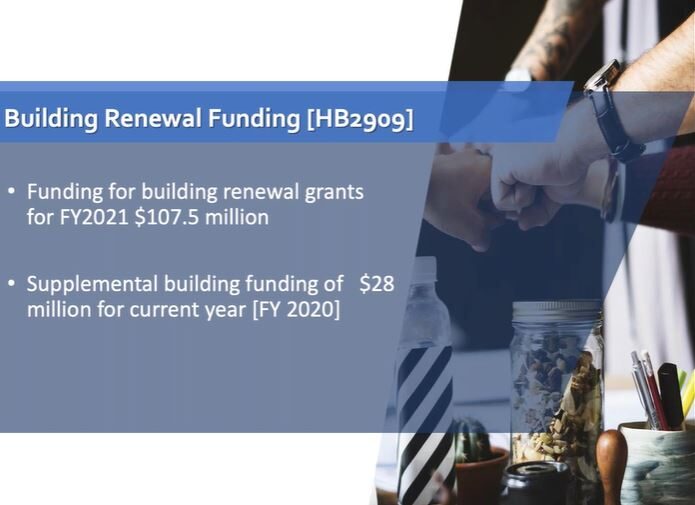
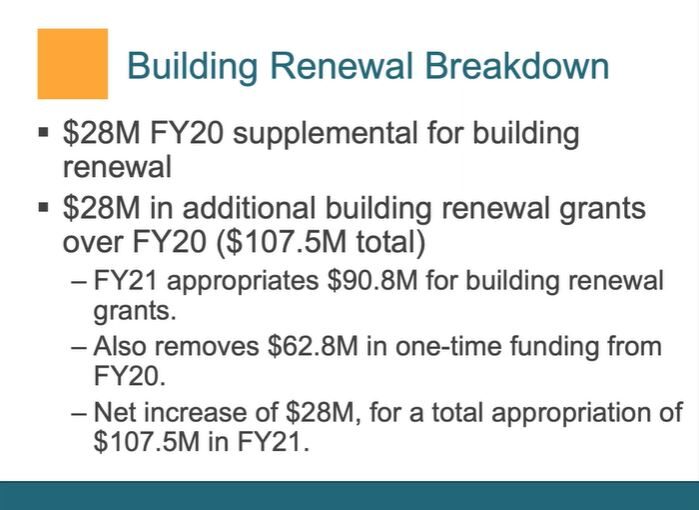
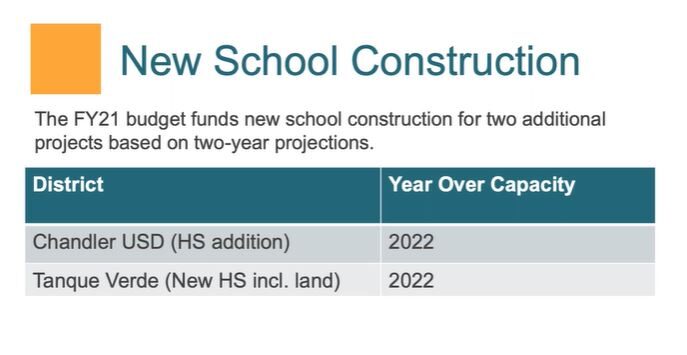
The funding estimate for Prop. 123 funding is to multiply what they’re getting this year by 1.5% said Dr. Anabel Aportela, director of research for Arizona Association of School Business Officials and Arizona School Boards Association.
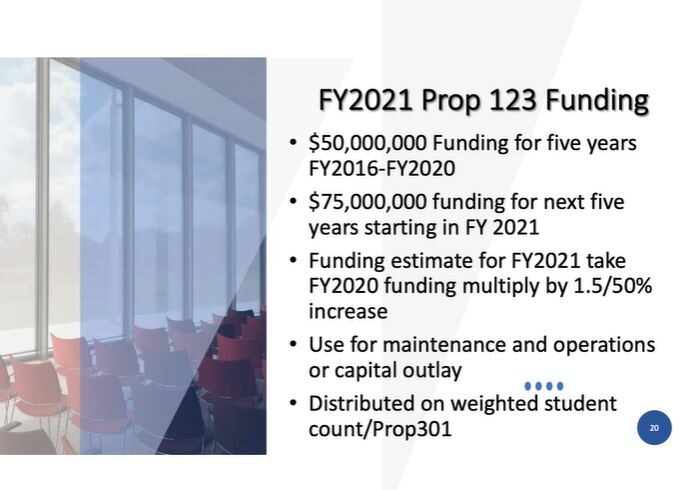
Next year’s results based funding will be based on the same dollar amounts in fiscal year 2020, Essigs said.
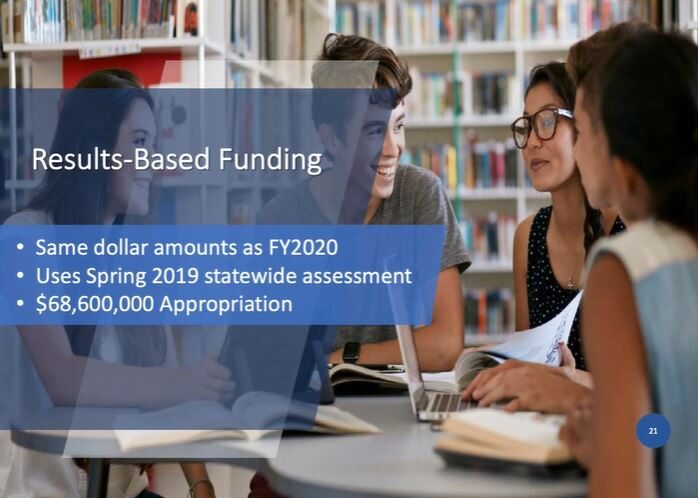
The Governor and Legislature intend for school districts to put more money into classroom spending, Essigs said.
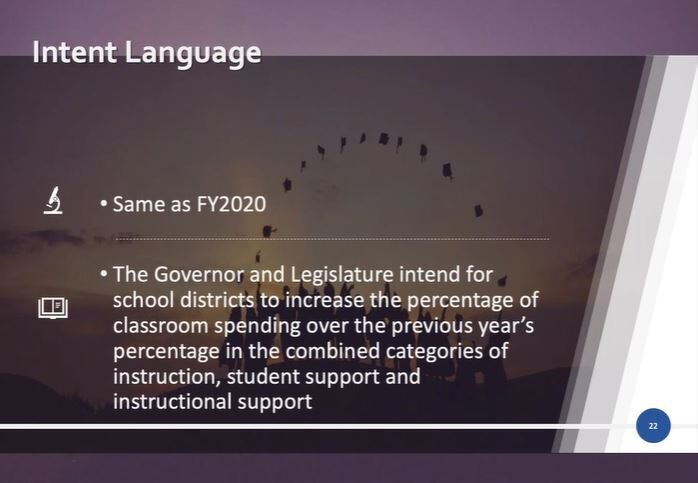
What they’re going to do in fiscal year 2022 is that they’ll take $64.1 million to go toward increasing teachers salary, Essigs said.
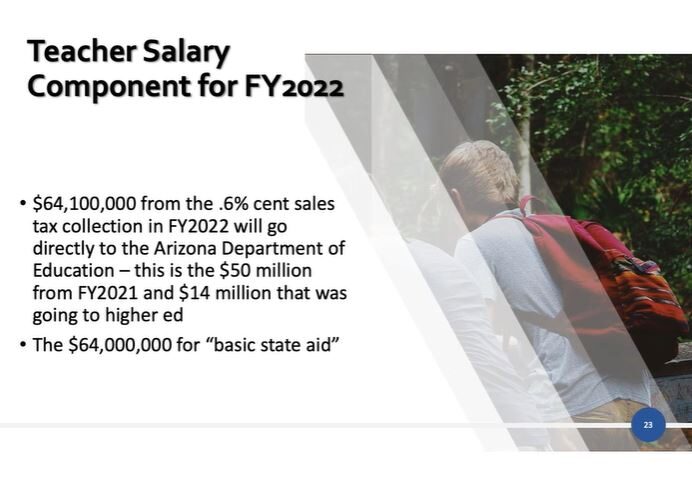
Once it gets into the funding formula it will get annual inflation increases, Essigs said.
In addition, the Office of the Attorney General has provided information on school procurement procedures related to the impact of COVID-19.
View the information at https://www.azed.gov/communications/2020/03/10/guidance-to-schools-on-covid-19/ click on “Procurement Practices” then “informal opinion here,” or just click here.
Updated March 24: The budget bills the Arizona Legislature passed yesterday await Gov. Doug Ducey’s signature to become law.
The bills include a $50 million to help mitigate the spread and impact of COVID-19.
The State Board of Education will hold an emergency meeting possibly on Wednesday morning on the responsibilities it is charged with in House Bill 2910, which deals with public school closures due to COVID-19 coronavirus, said Leigh Jensen, governmental relations associate with Arizona School Boards Association.
And a brief reminder, that ASBA and Arizona Association of School Business Officials will host a webinar at 10 a.m. Wednesday, March 25 about the details of the budget, HB 2910 , the school closure bill, and any new or updated rules from the State Board of Education.
March 23
The Arizona House and Senate approved the streamlined budget and other key legislation, then adjourned until Monday, April 13, 2020 or until the time legislative leadership have determined they should reassemble.
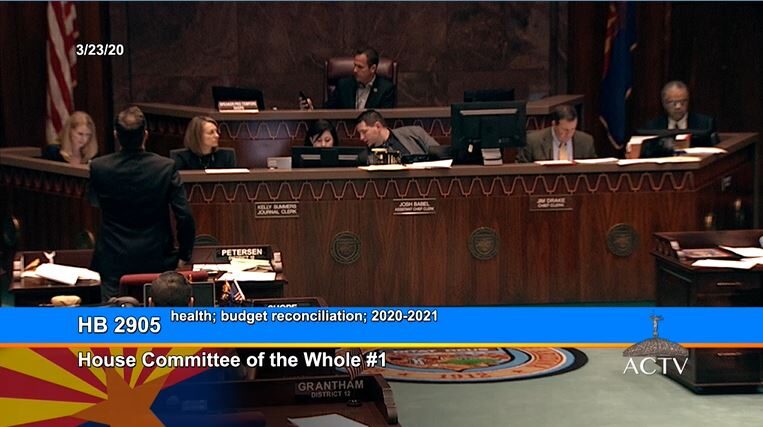
The Arizona House meets to discuss and vote on the streamlined budget and other key bills on March 23, 2020. Photo courtesy Arizona Capitol Television
So far, during the Committee of the Whole, House Bill 2911 sponsored by House Speaker Rusty Bowers that would have provided unemployment compensation has failed.
Update: House Republicans shoot down a Democratic amendment (29-31) to create a $28M small business and paid sick leave fund. #azfamily pic.twitter.com/xIZ5xC8hil
— Dennis Welch (@dennis_welch) March 23, 2020
On #HB2911 (SB1694) for unemployment compensation, Rep. @RaquelTeran offers amendment to create $28m small business paid sick leave fund. “Arizona will only be as healthy as our most vulnerable residents.” Rejected on party lines. #COVID19 #azbudget pic.twitter.com/CKHjKrbm6C
— Arizona House Democrats (@AZHouseDems) March 23, 2020
We just had a roll call vote on Paid Family and Medical Leave at the #AZLeg, which would have provided critical support during the #COVID19 crisis to families across AZ.
Look below to see for yourself where Legislators stand on supporting our families. Thank you @RaquelTeran! https://t.co/ZYoOrvV7E6 pic.twitter.com/EHlSsj3jx9
— LUCHA Arizona (@LUCHA_AZ) March 23, 2020
Rep. Robert Meza said HB 2905 would provide money so firefighters would be able to collect workman’s compensation from a system in place at DOA and would provide an insurance option now that CopperPoint is out of the market.
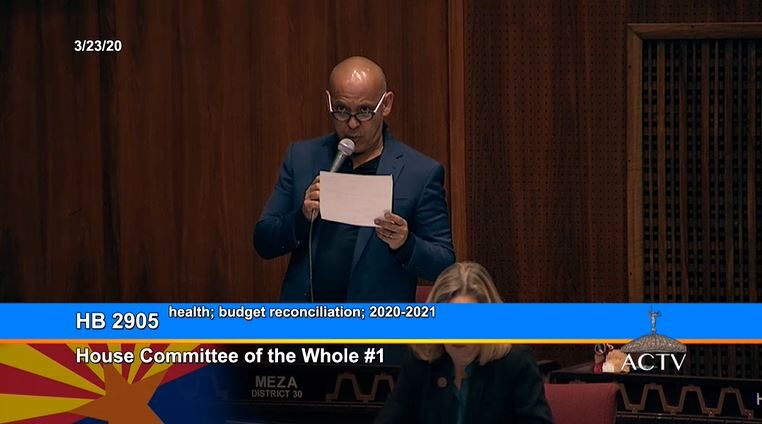
Rep. Robert Meza talks about his support for an amendment to HB 2905 March 23, 2020. Photo courtesy Arizona Capitol Television
‘The first responders and firefighters need our help,” Rep. Meza said. “We are behind the firefighters and please join me in this endeavor.
“If these amendments come on it blows up our Coronavirus package,” said House Majority Leader Rep. Warren Petersen. “Noboday’s arguing that we want to protect those who put their lives at risk.”
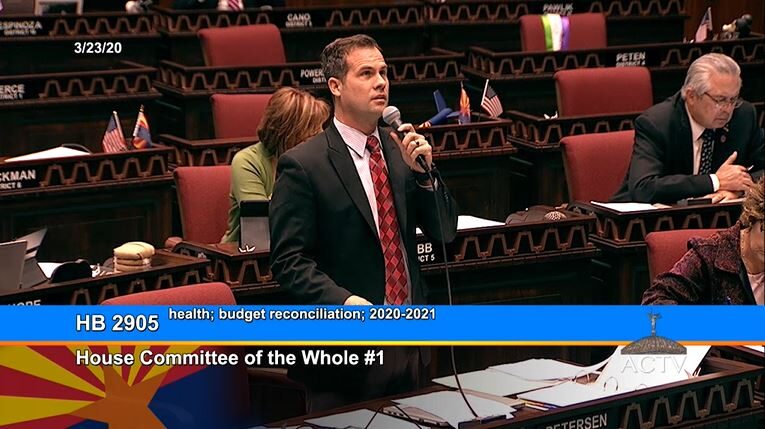
Rep. Warren Petersen talks about his support for HB 2905 without an amendment. Photo courtesy Arizona Capitol Television
The bill later received a due pass measure in the Committee of the Whole and be properly re-assigned.
Dems playing politics on the House floor. Dem minority leader “gave her word” the @AZHouseDems would not blow up the agreed upon Covid-19 aid package for Arizonans. Arizona needs a budget package now! #stopthegames @AZHouseGOP https://t.co/rqjUMVcMw1
— Anthony Kern (Text Trump to 88022) (@anthonykernAZ) March 23, 2020
House GOP procedurally sidestep Rep. @MezaArizona’s amendment to #HB2906 healthcare budget to help AZ firefighters with job-related cancers obtain workers’ compensation. #azbudget pic.twitter.com/dKE8XhjmXG
— Arizona House Democrats (@AZHouseDems) March 23, 2020
“When I drove in this morning, I was under the impression that we needed to get a budget passed today for Arizonans,” Rep. Anthony Kern said.
“We need to get in, get out, get back to our families and get aid to Arizonans,” Rep. Kern said.
#COVID19 amendments they are not letting @AZHouseDems offer:1 Save fire fighters 2 Prevent price gouging, evictions, foreclosures, utility disconnects, auto repos3 Help Dev Disability & childcare providers4 Increase unemployment & TANF $5 Small biz assist
6 All-mail elex https://t.co/AYJjT8eexd
— Rep. Athena Salman (@AthenaSalman) March 23, 2020
Portion of Rep. @KelliButlerAZ fighting for her amendment to prevent evictions, foreclosures, utility disconnections and car repossessions during ##COVID19 emergency. #azbudget pic.twitter.com/B6UwlB1CBs
— Arizona House Democrats (@AZHouseDems) March 23, 2020
At this moment, the Democratic Caucus is ready to pull all amendments to get this budget voted on, said House Minority Leader Charlene Fernandez.
UPDATE: Dems pull all of their amendments and move ahead with passing a budget that includes the #coronavirus aid package. #azfamily pic.twitter.com/3rNj0sYcDY
— Dennis Welch (@dennis_welch) March 23, 2020
After that, House Bills 2904, 2906 and 2907 were given a due pass recommendation.
The bills were then sent to third reading.
President @FannKfann, Majority Whip @SonnyBorrelli, Appropriations Chairman @DavidGowanAZ and Appropriations Vice-Chair @VinceLeach are working hard and watching the House Floor.
We hope that politics will be set aside, and our citizens and their safety prioritized!#COVID19 pic.twitter.com/3NVzILcepZ
— AZSenateRepublicans (@AZSenateGOP) March 23, 2020
“We need to do more, and we know that, and we will take steps to do more in the future,” said Rep. Aaron Lieberman as he voted aye on Senate Bill 1687, the human services budget reconciliation bill.
$50 million barely scratches the surface of what we need to ensure people are not homeless, that people can put food on their table, said Rep. Isela Blanc.
“The reality is many Arizonans are going to have a hard time getting out of it,” Rep. Blanc said as she voted aye on the bill.
Rep. Mark Finchem said this is an emergency, short term response that prepares us if we need to revisit this down the road.
“We have very finite resources and for us to take the time to be prudent and wise where we place those as we have federal programs responding to some of them is good,” Rep. Finchem said when he voted aye.
House Bill SB 1687 passed the House unanimously.
Important portion of #COVID19 emergency response bill #SB1687 now on the board. Passes unanimously to help streamline and expand TANF benefits during the crisis. #azbudget #azleg pic.twitter.com/1fVsqtw9Uo
— Arizona House Democrats (@AZHouseDems) March 23, 2020
Challenges teach us how to address that shortage to be better prepared for an event like the COVID-19 pandemic, said House Speaker Rusty Bowers.
“In the last downturn people lost jobs and houses and the government helped, but neighbors extended a helping hand,” House Speaker Bowers said.
“Lets all work together, let’s face it together and we will overcome it,” House Speaker Bowers said and voted aye for HB 1690.
“We need humanity today, yesterday and tomorrow,” said Rep. Raquel Teran.
Then Sen. Warren Peterson motioned that the House of Representatives sent the bills to the Senate and motioned to adjourn until April 13 or until legislative leadership decide the AZ Legislature will reassemble. The motion was approved.
AZ Legislature approves streamlined K-12 budget, unanimously approves bill to help closed schools
Updated March 19: The Arizona Legislature approved today HB 2902, the K-12 public education portion of the budget bills, and unanimously approved HB 2910 that helps schools closed by Coronavirus.
HB 2910 will go into effect immediately upon the signature of Gov. Doug Ducey, said Leigh Jensen, governmental relations associate for Arizona School Boards Association. Read ASBA’s summary of the legislation here.
AZ lawmakers moving to make it easier to get jobless benefits in wake of COVID-19. https://t.co/MXWY6PerP7
— Howard Fischer (@azcapmedia) March 20, 2020
HB 2902 , K-12 education budget reconciliation for 2020-2021, passed the House by a vote of 31-29 and the Senate by a vote of 24-6. Read ASBA’s summary of the budget here.
This “skinny budget” that was passed represents the minimum required to keep everything functioning as it should, if the legislature cannot safely return prior to July 1 due to COVID-19. View a spreadsheet of the FY21 budget here.
Yes while imperfect it was the best we could do to provide a safety net for all our citizens and to go home to our families and be safe https://t.co/xd4S0eGb92
— Sally Ann Gonzales (@GonzalesSally) March 20, 2020
If the legislature can return before the end of the fiscal year, depending on what the economic impact of the virus is, they may approve more spending for the priorities this session like accelerating DAA restoration and increasing special education funding, Jensen said.
For now, ASBA greatly appreciates the stability that this budget and HB 2910 will bring to school districts, Jensen said.
Both the Arizona House of Representatives and the Arizona Senate introduced budget bills Thursday with their versions of a streamlined budget, which is the JLBC’s baseline budget with a few changes, said Chris Kotterman, governmental relations director for Arizona School Boards Association.
Correction: $50M coronavirus aid package. https://t.co/SH38doTnDy
— Dennis Welch (@dennis_welch) March 20, 2020
These streamlined budget bills include the final installment for the 20 percent by 2020 teacher pay increase, as well as a further restoration of $68.5 million in District Additional Assistance and $3.4 million in Charter Additional Assistance, Kotterman said.
The proposed budget bills also include a $107.5 million in building renewal funding for fiscal year 2021, as well as $28 million in supplemental appropriation for the current fiscal year.
Rather than continue #AZBudget debate to include our Democratic #COVID19CrisisResponse plan, House Republicans abruptly adjourned until Monday. How many #COVID19 case will Arizona have by the time we pass a budget? #azleg
— Arizona House Democrats (@AZHouseDems) March 20, 2020
Both the Arizona House and Senate sent their budget bills through the Rules committee, and they underwent floor action and amendment today.
“At this point, we’re doing what we can that makes the most sense,” said Rep. Regina Cobb.
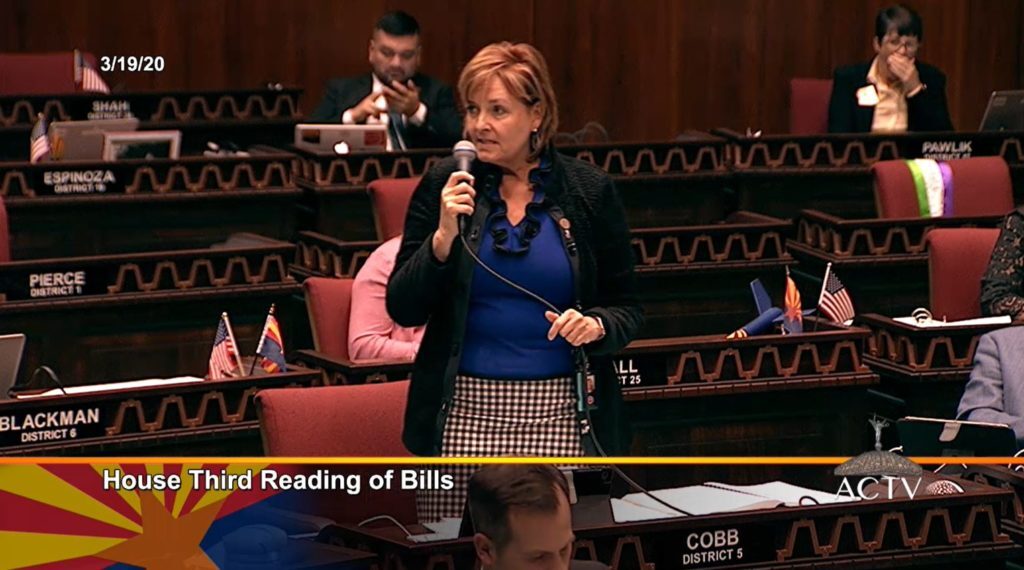 Rep. Regina Cobb discusses the streamlined budget bills March 19, 2020. Photo courtesy Arizona Capitol Television
Rep. Regina Cobb discusses the streamlined budget bills March 19, 2020. Photo courtesy Arizona Capitol Television
Rep. Cobb said the Arizona Legislature has no plans to Sine Die now, instead it will pass a streamlined budget providing what was in the past year’s budget and coming back after a brief recess.
“We are looking at a base level budget and we will come back in several months to adjust this as necessary,” Rep. Cobb said.
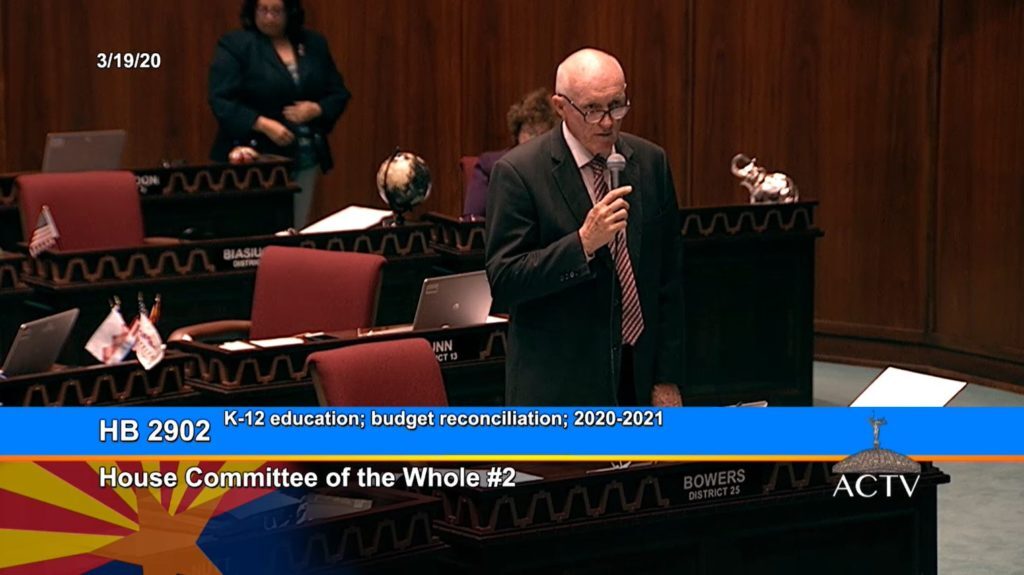 House Speaker Rusty Bowers describes the reasoning behind the streamlined budget March 19, 2020. Photo courtesy Arizona Capitol Television
House Speaker Rusty Bowers describes the reasoning behind the streamlined budget March 19, 2020. Photo courtesy Arizona Capitol Television
House Speaker Rusty Bowers said the intention was to put forward a streamlined budget, let staff go home, and break for several weeks for the COVID-19 outbreak then come back into session to adjust the budget for economic conditions.
“We took the decision to put this budget together with the help of many people and present it to the body,” House Speaker Bowers said.
Fill out this form if you would like ASBA text message updates on the latest, https://t.co/lKB77s57TP pic.twitter.com/6yqOBvzIAL
— Az School Boards (@AzSBA) March 19, 2020
Rep. Aaron Lieberman said he would not vote for House Bill 2902, the K-12 public education portion of the budget bills.
Rep. Isela Blanc asked if it was prudent to put $68 million into high stakes testing at a time when it would appear schools are not ready to test students.
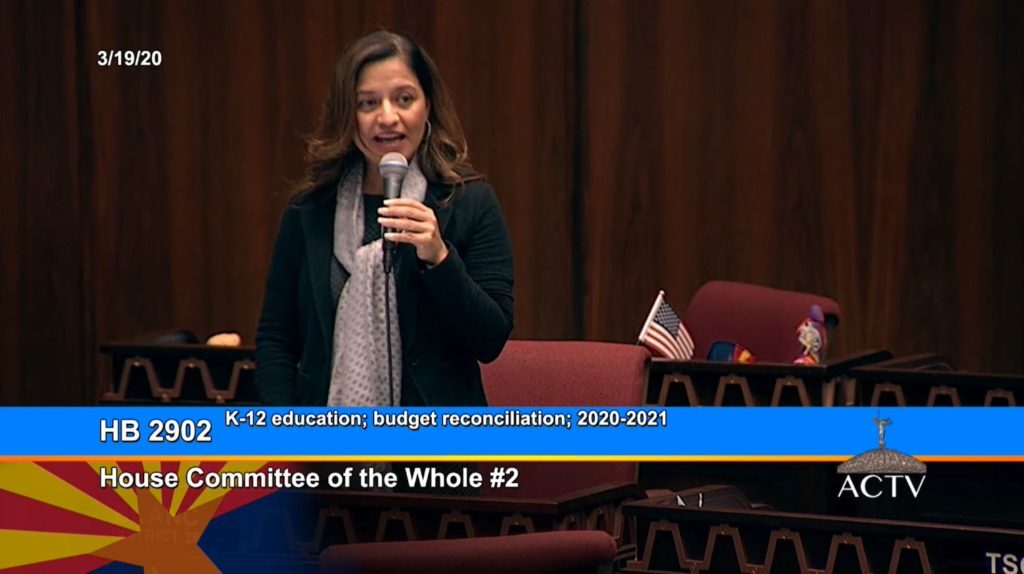 Rep. Isela Blanc discusses her concerns with the streamlined budget March 19, 2020. Photo courtesy Arizona Capitol Television
Rep. Isela Blanc discusses her concerns with the streamlined budget March 19, 2020. Photo courtesy Arizona Capitol Television
“We conclude their is enough money to include funding for high stakes testing,” Bowers said. “We’re showing that we can adapt to this virus, and we’re moving forward.”
“House Bill 2902 is necessary but just not right now,” Rep. Blanc said.
This page will be updated throughout the day.
The House is preparing to debate a pared-down #AZBudget. Democrats are pushing for a #COVID19 Emergency Response Plan to be included. We need to help Arizonans stay afloat, stay fed & stay safe through this crisis. #saveworkers #Covid19CrisisResponse #FlattenTheCurve pic.twitter.com/if4bGSCXBM
— Arizona House Democrats (@AZHouseDems) March 19, 2020
“House Bill 2902 at this time does not live up to the promise we made to our public schools, teachers, students and parents this year,” House Minority Whip Rep. Reginald Bolding said.
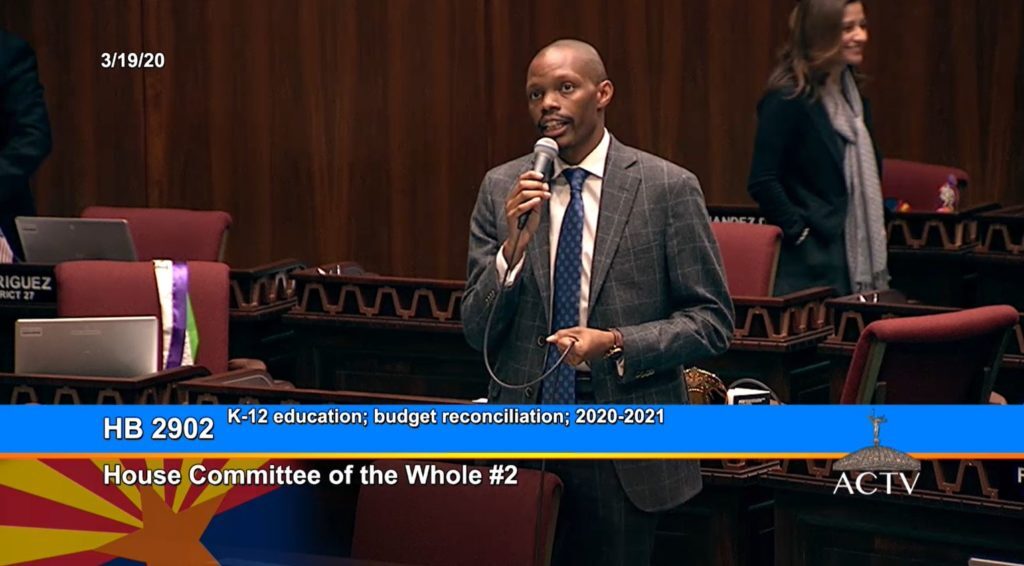 House Minority Whip Rep. Reginald Bolding expresses his lack of support for the budget bill March 19, 2020. Photo courtesy of Arizona Capitol Television
House Minority Whip Rep. Reginald Bolding expresses his lack of support for the budget bill March 19, 2020. Photo courtesy of Arizona Capitol Television
“There are inequities in this budget that I urge us to step back and address,” Rep. Bolding said. “I simply can’t support a K-12 budget that doesn’t meet the promises we made earlier this year.”
#AZHouse right now debating K-12 budget #2902 bill that prioritizes test scores over safe schools. “Fund tests now, safety later” seems the opposite of what one would do facing an unknown crisis. Let’s come back and discuss tests. Fund the priorities now. #FundDAA
— Joe Thomas (@AZ1Thomas) March 19, 2020
The House Committee of the Whole approved giving HB 2902 a due pass recommendation.
Then the House began discussion on House Bill 2903, the higher education portion of the budget bills.
Rep. Athena Salman said that the bill should include a moratorium on student loan payments, especially as COVID-19 is creating a severe economic downturn that may last for many months.
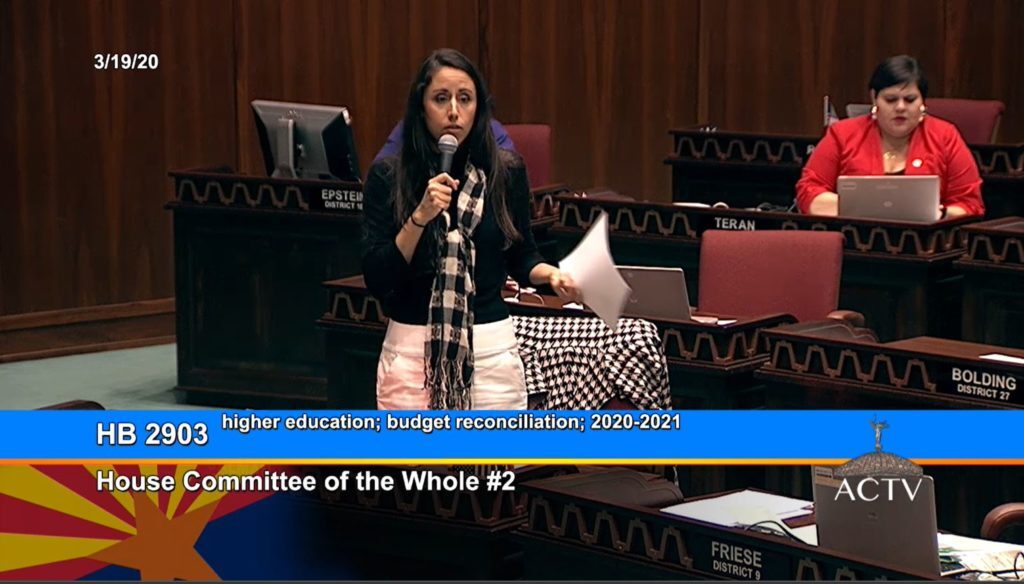 Rep. Athena Salman talks about her concern with the higher education portion of the budget bills. Photo courtesy of Arizona Capitol Television
Rep. Athena Salman talks about her concern with the higher education portion of the budget bills. Photo courtesy of Arizona Capitol Television
Rep. Andres Cano said he was disturbed to see there was no further support for community colleges in HB 2903, especially when so many people rely on them for career training.
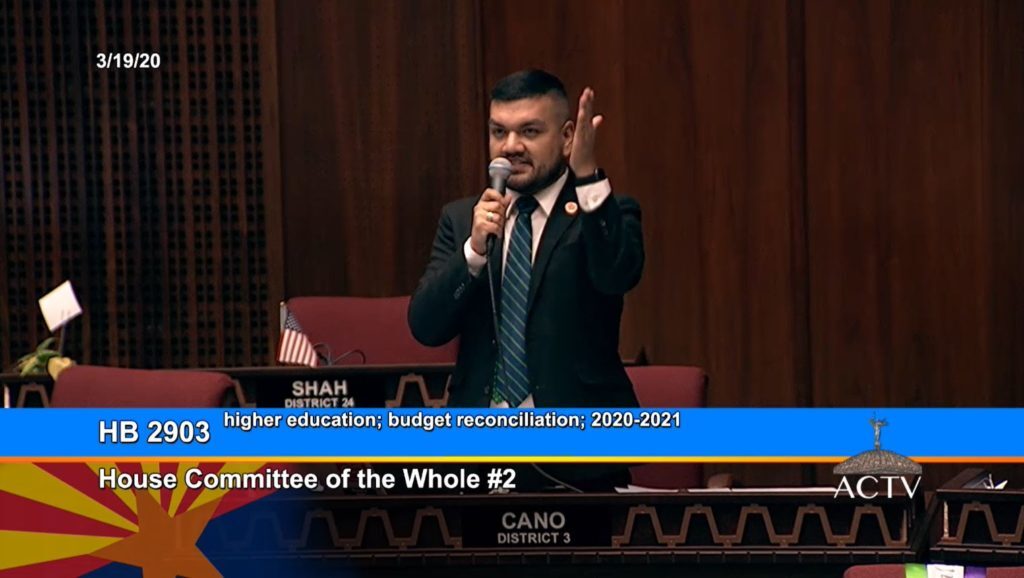 Rep. Andres Cano expresses his concern with the lack of funding for community colleges in HB 2903 on March 19, 2020. Photo courtesy Arizona Capitol Television
Rep. Andres Cano expresses his concern with the lack of funding for community colleges in HB 2903 on March 19, 2020. Photo courtesy Arizona Capitol Television
The House gave HB 2903 a due pass recommendation at 2:46 p.m.
Now voting on Education and Higher Education budget bills. These bills reflect last year’s funding levels and shortchange both. #AZBudget #AZleg
— Arizona House Democrats (@AZHouseDems) March 19, 2020
“In this moment of uncertainty, we owe it to our students to give school the extra money they need where they need it,” said Rep. Aaron Lieberman as he voted no on House Bill 2902, the K-12 education portion of the budget bill.
“It is incredibly irresponsible to vote on a skinny budget when we haven’t seen what this virus can do,” Rep. Isela Blanc said.
We should hold monies from unnecessary measures to deal with high unemployment and people losing housing, Rep. Blanc said as she voted no on HB 2902.
As we go forward in this recession, this budget will take more from students, schools and teachers as district additional assistance in it has not been adjusted for inflation, said Rep. Mitzi Epstein.
“We cannot burden our children with the outcomes of this recession,” Rep. Epstein said while voting no.
Rep. Dr. Randall Friese said he appreciated the joint effort to restore district additional assistance this year.
“If we cared about all our schools and not just our A schools we’d be fully restoring DAA this year and not funding results based funding,” Rep. Friese said.
“When we come back let’s get this budget right and get that money into our classrooms and to our students,” Rep. Friese said as he voted no on HB 2902.
“This budget continues to turn its back on the children of Arizona,” Rep. Athena Salman said.
District additional assistance is critical for districts like mine said, Rep. Raquel Teran.
“We really need to figure out how do we invest in our children,” Rep. Teran said voting no on the bill.
“In this time of crisis we must send a message of hope to our educational community that we will come out of this better, but a skinny budget does not do that,” said Minority Leader Rep. Charlene Fernandez as she voted no on HB 2902.
House Majority Leader Rep. Warren Peterson said “This budget is all about certainty. We are making sure that schools, towns, and cities can budget.”
“I know more district additional assistance is coming their way,” Rep. Peterson said voting for HB 2902.
On Third Reading, the House approved HB 2902, the K-12 portion of the budget bill, with 31 ayes and 29 nays. Then the bill was sent to the Senate.
“We are being asked with this vote to effectively cut $50 million from our universities. We know that in uncertain economic times people flood our colleges & universities. Instead of attacking the problem we are retreating.” – Rep. @aaron4az opposing GOP higher-ed budget #HB2309. pic.twitter.com/87xgJOKcJs
— Arizona House Democrats (@AZHouseDems) March 19, 2020
“Members, this is a baseline budget,” said Rep. Regina Cobb as she voted for HB 2903. “The extra funds the one-time funds we put in each year are on top of that.”
“We cannot plan that we’re going to be back in a week or two or three,” said Rep. Alma Hernandez. “This is a cut in my mind.”
“You cannot count on us coming back in a week or two. If you think that, you are fooling yourself and with that I vote no,” Rep. Hernandez said.
Then on Third Reading, the House approved HB 2903, the higher education portion of the budget bills, with 31 ayes and 29 nays. Then the bill was conveyed to the Senate for consideration.
Then the House went to rules, caucus and recessed until 4:45 p.m.
In the Senate, HB 2902 was substituted for an identical Senate Bill and underwent it’s first reading at 4:55 p.m.
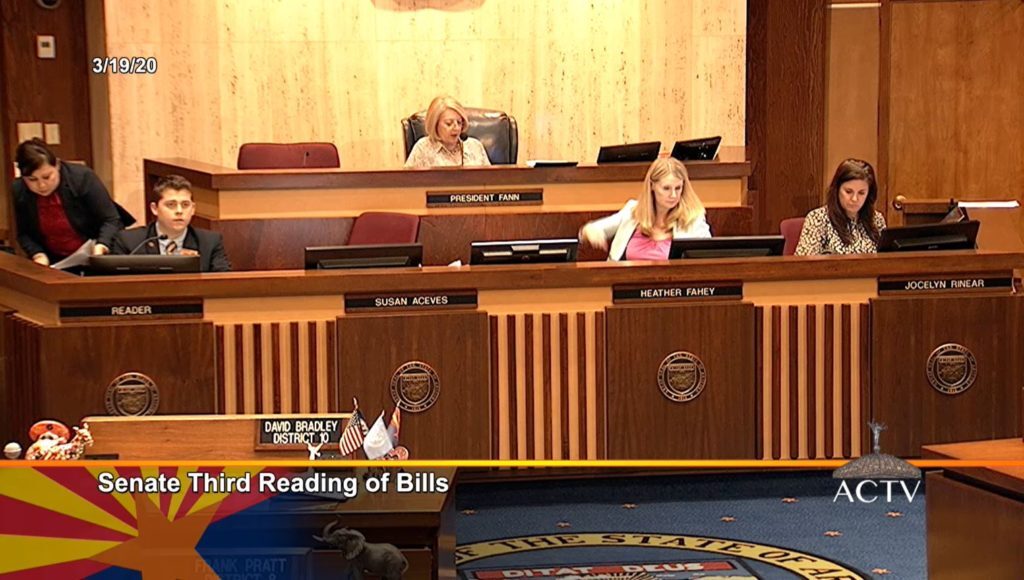 The Senate approved HB 2902, the K-12 public education portion of the budget bills, March 19, 2020. Photo courtesy of Arizona Capitol Television
The Senate approved HB 2902, the K-12 public education portion of the budget bills, March 19, 2020. Photo courtesy of Arizona Capitol Television
Sen. Martin Quezada said as he voted no on the bill. “In this time right now, we could have used that funding and put it into district additional assistance and it would have been more equitable.”
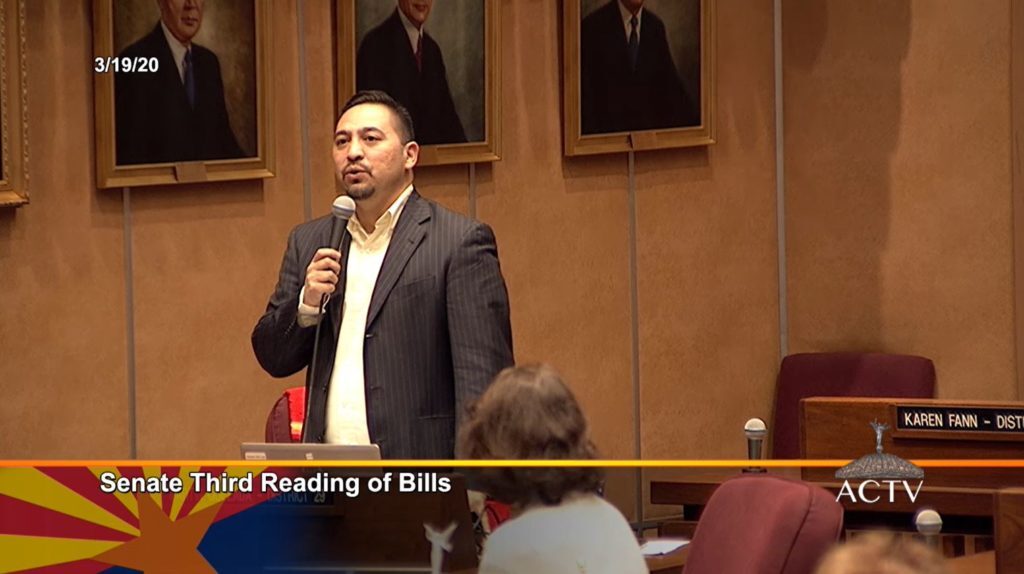 Sen. Martin Quezada says why he cannot support HB 2902, the K-12 public education portion of the budget bills March 19, 2020. Photo courtesy Arizona Capitol Television
Sen. Martin Quezada says why he cannot support HB 2902, the K-12 public education portion of the budget bills March 19, 2020. Photo courtesy Arizona Capitol Television
The Senate approved HB 2902 with a vote of 24 to 6, and transmitted it back to the house at 4 p.m.
There does not appear to be a broad agreement on the path forward for the budget, or the rest of session for that matter, Kotterman said.
As the budget develops, ASBA’s governmental relations team will provide further information, Kotterman said.
As lawmakers grapple with “baseline” budget, Dems contend some GOP lawmakers not taking the dangers of the outbreak seriously. https://t.co/4XF3OJwvVi pic.twitter.com/olUcvcQUdz
— Howard Fischer (@azcapmedia) March 19, 2020
As Rep. John Allen offered the invocation he asked for “a unified effort today to do what is right, because it is right, until it feels right.”
Then he said he hoped “the work of this body provides for our citizens the assurance they need in this trying time.”
House Bill 2910 public school closures due to Coronavirus and House Bill 2911 on unemployment compensation were sent to Rules Committee.
Then House Majority Leader Warren Peterson moved that emergency be declared so that HB 2910 could be brought for Committee of the Whole debate and Third Reading. Then he called for representatives to go to Rules Committee, then caucus, and return to the floor after that.
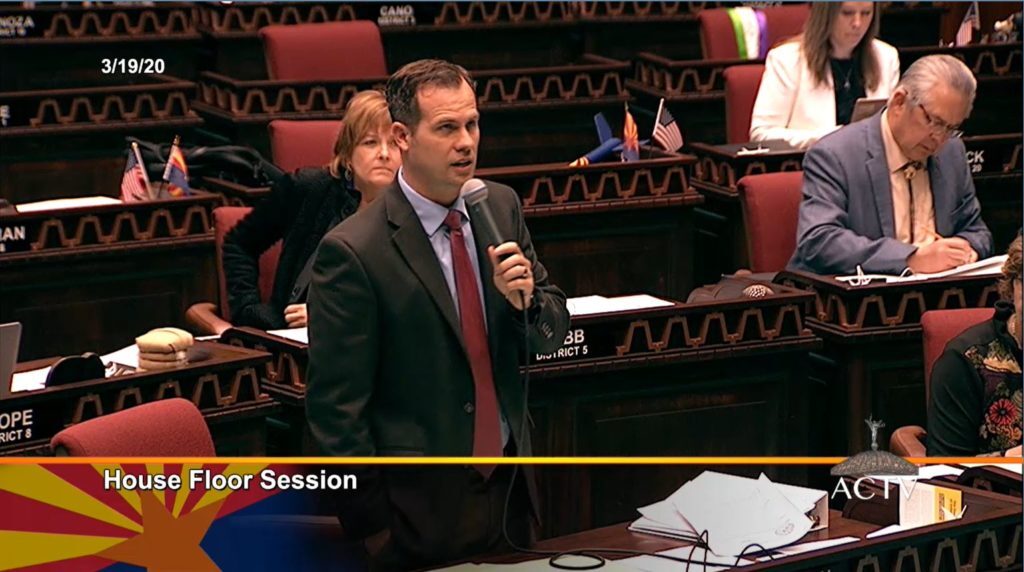 House Majority Leader Warren Peterson at the Arizona Legislature on March 19, 2020. Photo courtesy Arizona Capitol Television
House Majority Leader Warren Peterson at the Arizona Legislature on March 19, 2020. Photo courtesy Arizona Capitol Television
Bills to help schools closed for Coronavirus
Yesterday, Arizona legislative leadership introduced Senate Bill 1693 and House Bill 2910 about public school closures due to Coronavirus. The bills are similar and intended to address some of the technical provisions of how districts handle the mandated closure, Kotterman said.
“This bill provides maximum flexibility for schools to do what’s in the best interests of their students,” said Rep. Michelle Udall during the Committee of the Whole.
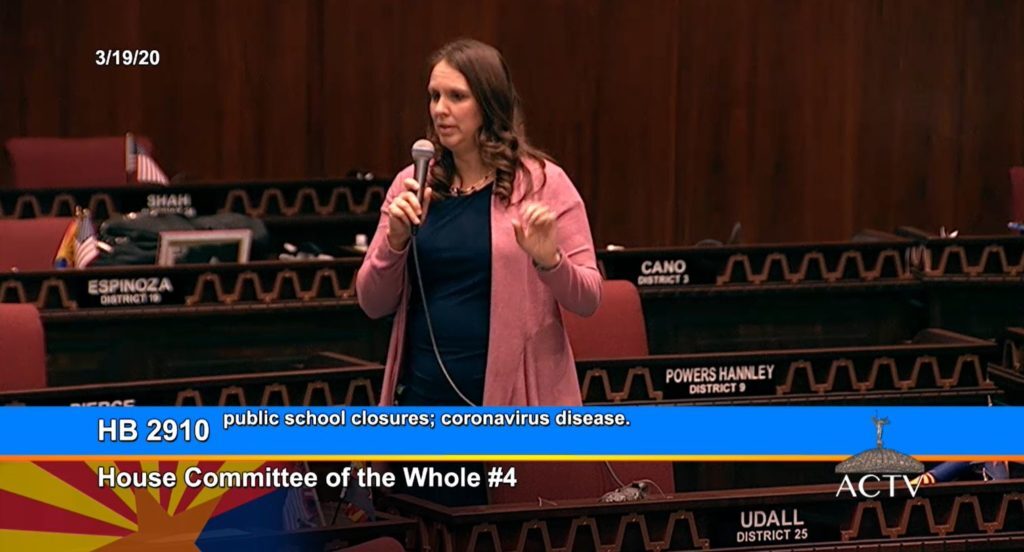 House Education Chair Rep. Michelle Udall describes how the bill will help schools and students during the COVID-19 school closures on March 19, 2020. Photo courtesy of Arizona Capitol Television
House Education Chair Rep. Michelle Udall describes how the bill will help schools and students during the COVID-19 school closures on March 19, 2020. Photo courtesy of Arizona Capitol Television
The bills take into consideration what would happen for the current two-week mandated closure, and what could happen if the closure extends past March 30. ASBA’s governmental relations team have put together a summary of the bills’ provisions.
Essentially, the bills would provide relief from minimum instructional requirements, push back testing windows, and provide authority for staff pay for the two week shutdown period, Kotterman said.
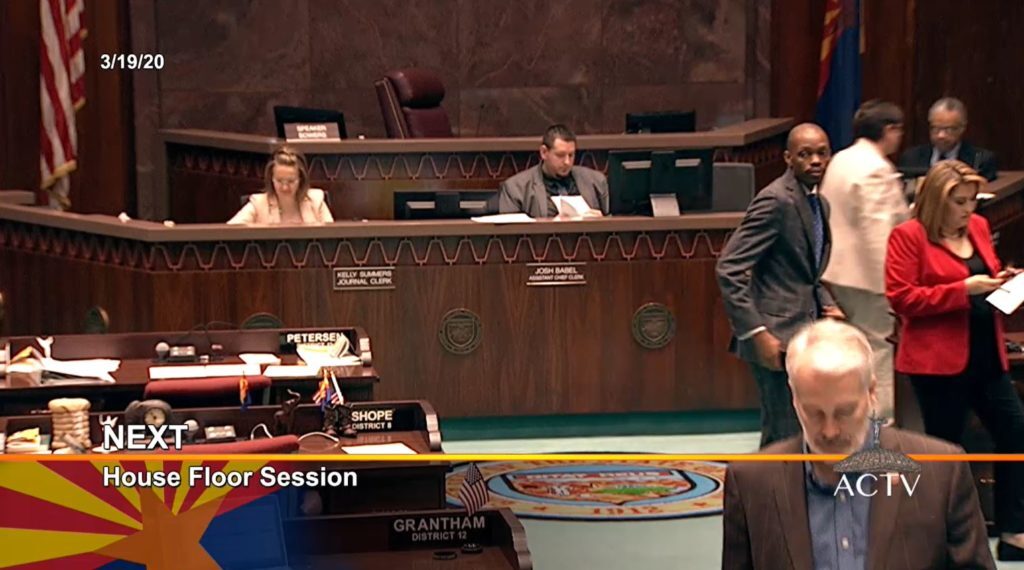 Arizona Representatives get ready for a floor session to discuss budget bills on March 19, 2020. Photo courtesy of Arizona Capitol Television
Arizona Representatives get ready for a floor session to discuss budget bills on March 19, 2020. Photo courtesy of Arizona Capitol Television
After March 30, if schools are still closed, schools will be required to make some efforts to provide educational opportunities to students in order to receive continued instructional hours flexibility, and more aggressive actions including the cancellation of AzMERIT 2 testing, suspension of Move On When Reading, and other issues, Kotterman said.
The bill allows schools to determine how teachers will deliver instruction and ensure they are still working the same number of hours to do that, Rep. Udall said.
In addition, if the school closures continue schools will be held harmless on the results, Rep. Udall said.
“We want them focusing on learning opportunities for students,” Rep. Udall said during the Committee of the Whole.
“The bill also states we will not extend the school year past the already released calendar,” Rep. Udall said.
“We are in uncharted territory and we are dealing with things we’ve never seen before,” said Rep. Aaron Lieberman.
Rep. Reginald Bolding asked how the bill will help students looking to graduate this May.
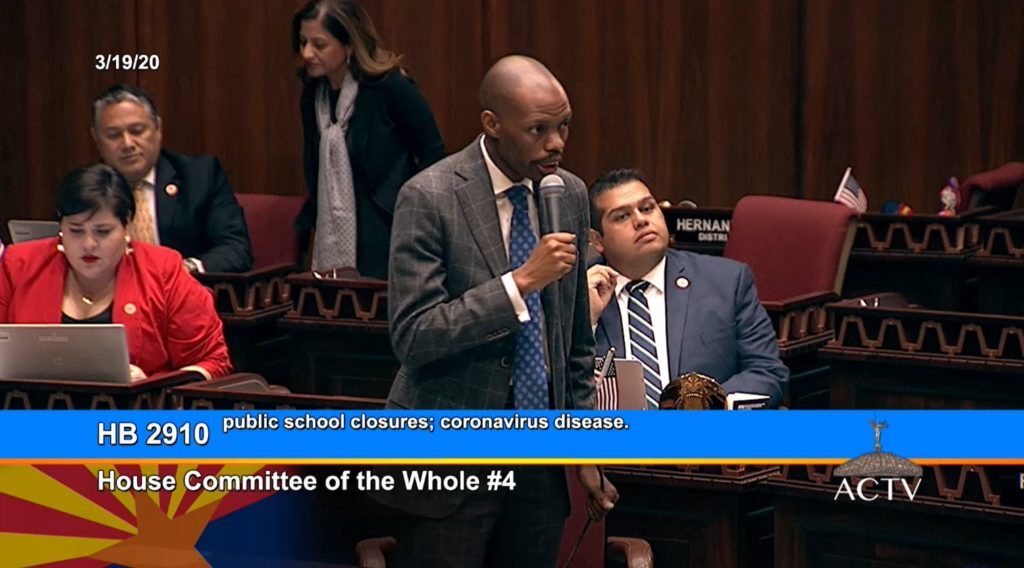 Rep. Reginald Bolding asks questions about the bill to help schools during the COVID-19 closure on March 19, 2020. Photo courtesy Arizona Capitol Television
Rep. Reginald Bolding asks questions about the bill to help schools during the COVID-19 closure on March 19, 2020. Photo courtesy Arizona Capitol Television
“If a student was on track to graduate in May, we’re going to make sure there’s a way for them to graduate with all their credits intact,” Rep. Udall said.
Rep. Arlando Teller asked how this bill recognizes the needs and challenges of schools in Arizona’s rural and remote areas as well as in tribal areas.
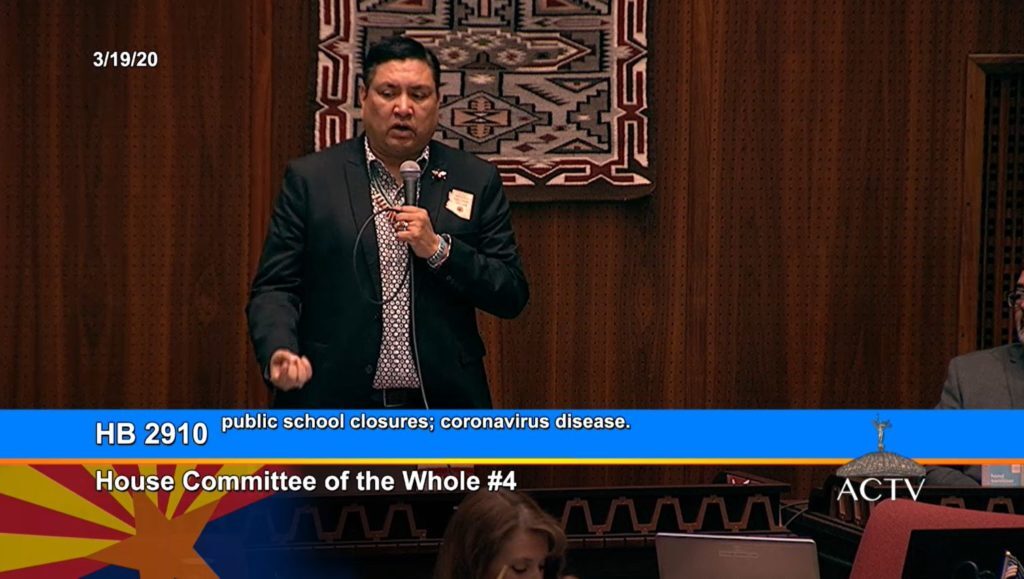 Rep. Arlando Teller asked how this bill recognizes the needs and challenges of schools in Arizona’s rural and remote areas as well as in tribal areas. Photo courtesy Arizona Capitol Television
Rep. Arlando Teller asked how this bill recognizes the needs and challenges of schools in Arizona’s rural and remote areas as well as in tribal areas. Photo courtesy Arizona Capitol Television
“There are options there we have to get creative on,” Udall said. “We know it can’t all be online. It’s flexible so each district can rech out best to the students they serve.
“These concerns are real in my district,” Rep. Teller said. “Bus drivers delivering assignments is a great idea, but what happens if the bus drives off the road due to the snow and rain we have up there.”
“I have sincere concerns this does not reach far enough for communities that have these challenges,” Rep. Teller said.
Rep. Jennifer Longdon asked how schools will provide federally mandates services for special education students with IEPs and 504s.
“We’re not going to reach everyone’s needs, but we are going to try to do the best that we can do,” Rep. Udall.
“We are not going to be able to do a one size fits all for everyone, but I want us to realize there are large wedges of our populations whose needs won’t be met without that flexibility,” Rep. Longdon said.
At 12:32 p.m., the bill was approved by the Committee of the Whole to be properly assigned.
Rep. Petersen then moved that the bill be given it’s third reading which was approved and House members voted on the bill.
House Speaker Rusty Bowers told Representatives “This bill is an emergency measure and will require a 2/3 vote.”
“With a quarter of the school year left, we are unsure if students will return to the classroom,” Rep. Udall said as she explained her vote. “It’s time to step outside our comfort zones and find ways for students to continue learning when they can’t be in schools.”
The House approved the bill unanimously at 12:58 p.m. and sent the bill to the Senate.
Then the House began the Committee of the Whole to focus on budget bills.
Please take a moment to read the summary, but know that the bill is likely to be further amended before it is passed, Kotterman said.
The Legislature is operating at breakneck pace to address these issues. For example, this bill was introduced today, sent directly to the rules committee, and is ready for floor action and final passage as early as today, Kotterman said.
ASBA and our partner organizations have been working together to secure needed changes and adjustments to the bills and will continue to do so until the last possible moment, Kotterman said.
Issues on the list to be addressed include more specificity around staff pay, particularly for hourly staff, specific tweaks to ensure CTEDs are included, specificity around holding schools harmless for letter grades, and other technical adjustments, Kotterman said.
“We are working to provide maximum flexibility for school districts while recognizing that in order to be effective immediately upon the Governor’s signature, two-thirds of both House and Senate will have to vote for it, which means the bill must get both Republican and Democrat votes,” Kotterman said.
ASBA will provide a complete summary of amendments on Friday.
11:29 a.m. – During the Democratic Caucus meeting, Rep. Isela Blanc asked what would happen if schools or students are in a rural areas or are without a robust online option for educational opportunities.
A school district could have a bus driver bring a teacher or educational packets to students to deliver that instruction, a House staff member responded.
More information about legislation
Information about education bills moving through the Arizona House and Senate is courtesy of Arizona School Boards Association‘s Governmental Relations team.
You can click here to sign up here for their Daily In Session Update email.
Once you sign up, you’ll receive an email with your password. Once you receive it, click the Login link and use the password along with your email address to login.
March 18
The Arizona Legislature recessed today after passing bills to discuss a streamlined budget Thursday morning and possibly end the session in response to COVID-19 Coronavirus.
Yesterday: The House dropped budget bills and the Senate went home. Today: The House plans to start debating budget bills and the Senate hopes to introduce them.
By Friday: The 2020 #AZleg session could be recessed or completely over.https://t.co/SWSm1IerNE
— Julia Shumway (@JMShumway) March 18, 2020
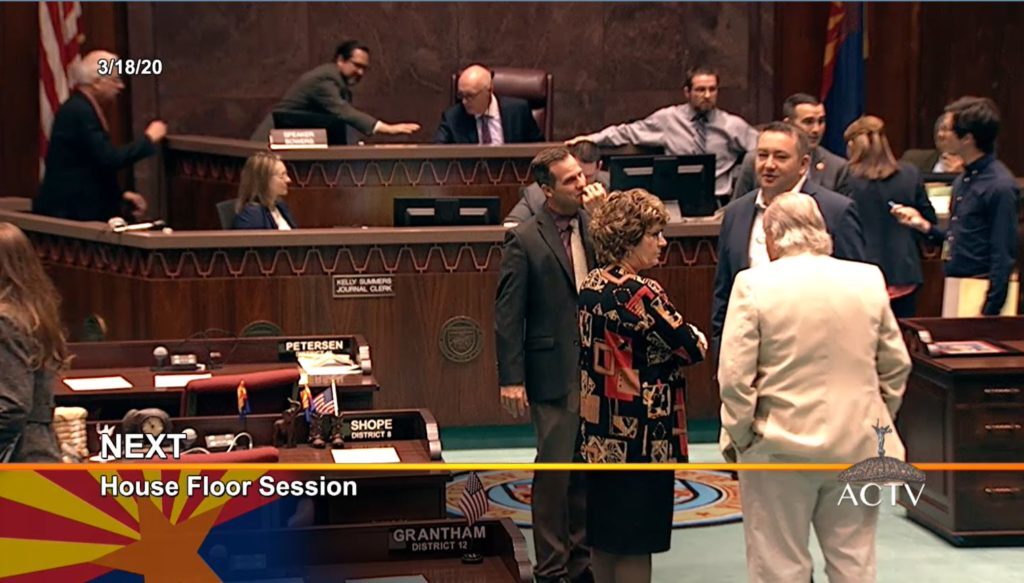 Arizona Legislature’s Committee of Whole meets on March 18 in an effort to pass a streamlined budget bill this week. Photo courtesy Arizona Capitol Television
Arizona Legislature’s Committee of Whole meets on March 18 in an effort to pass a streamlined budget bill this week. Photo courtesy Arizona Capitol Television
Guys, I want to go home too. We NEED a pandemic package before we go. That’s how we protect Arizonans.
— Rep. Jennifer Longdon (@JenLongdon) March 17, 2020
The Arizona House is meeting now to discuss a series of bills including HB2902, the K-12 education budget reconciliation bill for the 2020-2021 school year and HB2903, the higher education budget reconciliation bills for 2020-2021.
Republican Legislators Propose Emergency Measures to Ensure Arizona Students Can Finish School Year. #AZLeg https://t.co/szE7g16QgP pic.twitter.com/2cDObJm3Pm
— AZ House Republicans (@AZHouseGOP) March 18, 2020
When SCR 1025 was put up for a vote, a number of Legislators said it was an unnecessary distraction from voting on critical budget bills.
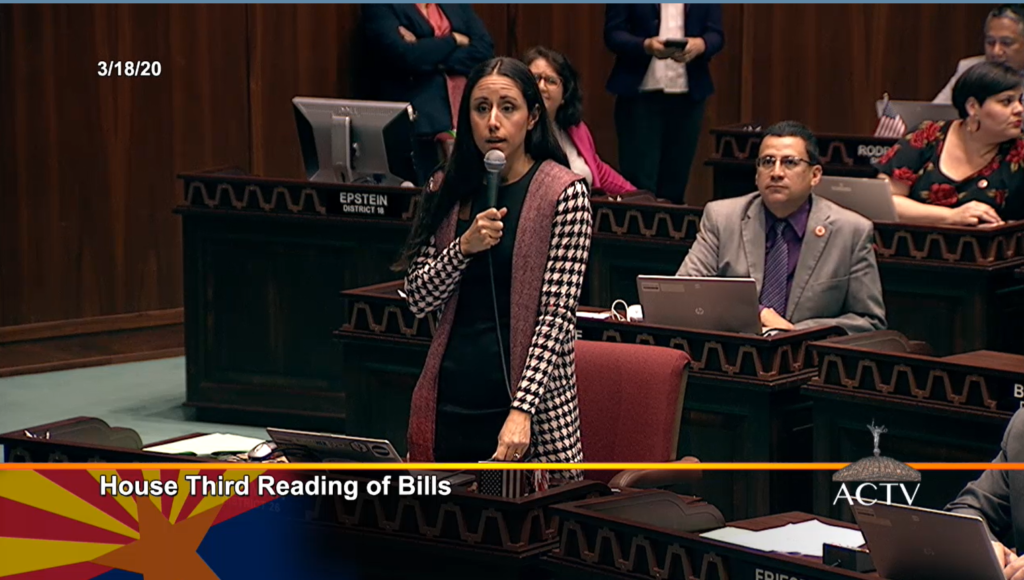 Rep. Athena Salman addresses Representatives during the Third Reading on March 18, 2020. Photo courtesy Arizona Capitol Television.
Rep. Athena Salman addresses Representatives during the Third Reading on March 18, 2020. Photo courtesy Arizona Capitol Television.
“This is a waste of our time, and not part of this critical day’s work,” said Rep. Athena Salman.
Rep. Charlene Fernandez reminded legislators that they are in violation of CDC recommendations not to be in groups of 10 and putting people’s health at risk and should not be voting on legislation that is not critical at this point.
The bill was later approved by the House.
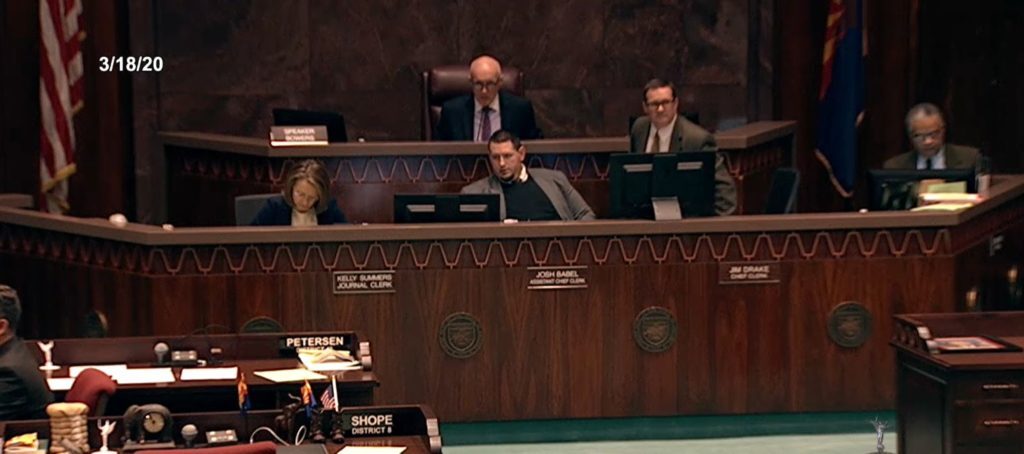 Arizona Legislators meet on March 18 in an effort to pass some bills and a streamlined budget bill this week in response to the COVID-19 Coronavirus. Photo courtesy Arizona Capitol Television
Arizona Legislators meet on March 18 in an effort to pass some bills and a streamlined budget bill this week in response to the COVID-19 Coronavirus. Photo courtesy Arizona Capitol Television
Then Representatives brought SB1399 , which includes reviser’s technical corrections for 2020 up for a vote.
“I think it’s incredibly irresponsible to vote on bills without a briefing,” said Rep. Mitzi Epstein.
Then she asked to break the meeting, take time to look at the bills dropped, caucus them and let the public speak up and be heard.
“I do not see any reason to be in this room at all today,” Epstein said. “We could be at home consulting with staff and revising bills.”
After that the Majority Leader said the idea was to vote on a couple noncontroversial bills, then take home the budget bills to read, consult on and discuss them tomorrow morning in session, and representatives thanked him for that explanation.
Representatives later approved the bill.
Then Representatives voted on House Bill 2684, an emergency measure to allow underperforming districts to develop a crisis management team.
After Rep. Grantham said there was a low viral infection rate right now and he didn’t think there was much risk from COVID-19, Rep. Kelli Butler said she and many others were concerned that they shouldn’t be here exposing each other and their staff to the risk of spreading the virus.
After a GOP colleague dismissed #COVID19 precautions as an overreaction and not a serious public health threat, Reps. @KelliButlerAZ, @AthenaSalman & @DrRandyFriese set the record straight. The infected rate in AZ is going to grow, we must flatten the curve. Here is Dr. Friese: pic.twitter.com/hyx0KKB38N
— Arizona House Democrats (@AZHouseDems) March 18, 2020
Here’s perspective from a local pediatrician on how families can cope with #COVID19 concerns: https://t.co/oEL7ijymCZ Our Q&A discusses protecting your family’s health, addressing kids’ fears, and learning more about #coronavirus facts. #familyhealth #kidshealth #healthadvice pic.twitter.com/Ea7n3hF0vL
— Raising Arizona Kids (@RAKmagazine) March 18, 2020
Rep. Regina Cobb thanked representatives for moving forward on the bill she had been working on for five years, and she said it would help many students in struggling schools.
Representatives then approved the bill.
The House Speaker Rusty Bowers recessed the House until 10 a.m. Thursday, March 19, 2020.
Those of us, like Rep. Teran, who recognize the need to #FlattenTheCurve are pushing for a #CovidRescuePlan as part of the AZ state budget. We need plans for health & economic support.
We must work based on scientific models of what CAN happen, not be blinded by current data. https://t.co/e2ot4jOl1o
— Mitzi Epstein (@MitziEpstein) March 18, 2020






